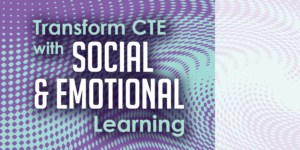Imago’s goal is simple: Change the world with social and emotional learning (SEL). The company hopes to create a better workforce by fostering SEL in career and technical education (CTE) programs across the country. Lessons that center these valuable skills, which employers crave, can support and enhance high-quality CTE.
Social and emotional learning activities help students become more empathetic, more thoughtful, more adept at dealing with stress and change, and more open to working with others.
For instance, a teacher may encourage students to place themselves in the shoes of historical figures or compare the bigger picture with the smaller when studying geometric proofs. Participating educators integrate video-based lessons from Imago into their CTE curriculum with the hope of fostering a more functional classroom, better employees, better leaders and, eventually, a better business economy.
SEL develops empathy >amp; understanding for others.
Emotional intelligence — also known as emotional quotient (EQ) — can be described simply as one’s ability to notice, evaluate and respond appropriately to emotions felt by themselves and others. But knowing, intellectually, what to do isn’t the same as developing the skills to employ what you’ve learned. This takes a large degree of self-awareness. For instance, regulating one’s emotions to avoid impulsive behavior takes care and practice but leads to far better communication and conflict resolution skills down the line. Learning to be more cognizant of your peers’ emotions requires a dedication to caring about what they’re feeling in the first place.
Lessons surrounding emotional intelligence must be layered, nuanced, digestible, and applicable.
Jennifer Fowler, who works at Greenway High School in Arizona, said Imago’s guidance on EQ, discussed at ACTE’s CareerTech VISION 2021, drove her to learn more. And Snehal Bhakta, of Nevada’s Clark County School District, concurred. “I teach future teachers, and our future teachers — that workforce — really needs to know about all of this,” said Fowler.
“If we don’t understand what others are going through in different parts of the country, how can we expect our teachers or ourselves to understand what a group of students are going through in our classrooms?” asked Bhakta. “EQ is SEL. It prepares students for careers, and it prepares our educators to prepare our students for careers.’”
Social and emotional learning offers benefits schoolwide.
Engagement in social and emotional learning creates more well-rounded humans, students, community members, and business leaders. Meaning when they arrive in their future offices, they’ll be good workers — and good to work with. Each year, Imago serves more than 110,000 students across the nation, challenging them to reflect and grow rather than simply memorize facts. Students have completed hundreds of thousands of online lessons, with the most popular all centering around emotional intelligence in CTE. Frequently engaged topics include:
- Communication skills
- Self-awareness
- Self-control
- Accountability
- Teamwork
- Empathy
In “SEL Schoolwide,” a session from Imago at ACTE’s CareerTech VISION 2022, two school leaders will share their experience in designing, developing and implementing instruction that incorporates SEL in the CTE classroom.
SEL helps educators prioritize wellness.
Social and emotional learning curriculum, integrated within CTE, doesn’t only bene.fit the students. It can be valuable for the educators as well. Adults can boost their EQ, become more patient with themselves and others, and learn skills to help them manage stress. Just like students can. As educators and students learn better communication skills and to become more empathetic, the classroom becomes a more inviting place. Ideas have space to thrive. Students feel more comfortable sharing their ideas and asking questions, and the amount of time educators spend handling disruptions declines. Further, the Imago lessons provide a fantastic opportunity for teachers to take a break while students engage in interactive SEL. “It’s a really great resource that we can use in a way that works best for our students, our time frame,” attested Emma Godfrey, an educator with Great Oaks Career Campuses in Ohio. “It’s nice and adaptable.
“The thing I love the most about it is, after the lessons and the units, there are always these extensions…” she continued. “I’m a very hands-on person; CTE students are very hands-on people. Imago offers a great program, and I really love it.”
Imago hopes to infuse social and emotional learning into all lessons, for all students.
As they learn to communicate, accept feedback, and comport themselves professionally, they’ll be more capable of taking initiative and finding themselves in leader.ship roles. In changing the way people approach a workplace environment to include more kindness, Imago can, in time, change the world.
But a challenge remains. “How do we support enough educators so that all 50 million of our students have the skills not only to be successful in work, to get the jobs, but to be happy in their jobs? Also, how does that spill over to the community — to be happy in this world?” Edgar Blunt, co-founder and chief executive at Imago, asked these questions during VISION 2021. And we’ll ponder the answers as VISION 2022 in Las Vegas, Nevada, draws closer.
Several sessions hosted by Imago at ACTE’s CareerTech VISION 2022 will challenge educators to explore the intersections of inclusion, access, equity, and diversity (IAED) and social and emotional learning. Presenters and attendees will consider why those topics are important. How do they impact the future of education and employment? How can educators implement strategies that boost IAED and SEL concept? And what new innovations are available to assist with that process? Expect to leave Las Vegas energized, goal-oriented, and altogether changed.
Marie Edinger is a journalist.









